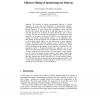Free Online Productivity Tools
i2Speak
i2Symbol
i2OCR
iTex2Img
iWeb2Print
iWeb2Shot
i2Type
iPdf2Split
iPdf2Merge
i2Bopomofo
i2Arabic
i2Style
i2Image
i2PDF
iLatex2Rtf
Sci2ools
167
click to vote
SSD
2001
Springer
2001
Springer
Efficient Mining of Spatiotemporal Patterns
The problem of mining spatiotemporal patterns is finding sequences of events that occur frequently in spatiotemporal datasets. Spatiotemporal datasets store the evolution of objects over time. Examples include sequences of sensor images of a geographical region, data that describes the location and movement of individual objects over time, or data that describes the evolution of natural phenomena, such as forest coverage. The discovered patterns are sequences of events that occur most frequently. In this paper, we present DFS_MINE, a new algorithm for fast mining of frequent spatiotemporal patterns in environmental data. DFS_MINE, as its name suggests, uses a Depth-First-Search-like approach to the problem which allows very fast discoveries of long sequential patterns. DFS_MINE performs database scans to discover frequent sequences rather than relying on information stored in main memory, which has the advantage that the amount of space required is minimal. Previous approaches utilize ...
Related Content
| Added | 30 Jul 2010 |
| Updated | 30 Jul 2010 |
| Type | Conference |
| Year | 2001 |
| Where | SSD |
| Authors | Ilias Tsoukatos, Dimitrios Gunopulos |
Comments (0)

